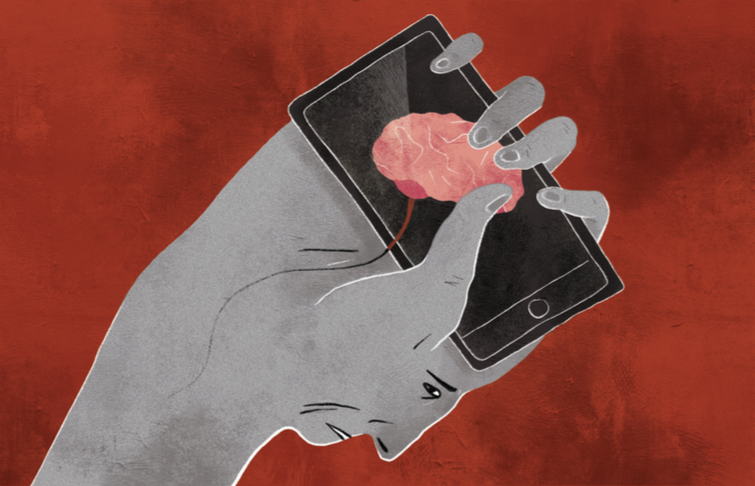Is Your Smartphone Draining Your Brain?
Adrian Ward has dared to question everyone’s favorite tech device. His findings will doubtless open further inquiry and perhaps spur new work habits.
By Adrienne Dawson

A new study from the McCombs School finds that your cognitive capacity is reduced when your smartphone is within reach — even if it’s off. Marketing Assistant Professor Adrian Ward and co-authors conducted experiments with nearly 800 smartphone users to measure, for the first time, how well people can complete tasks when their devices are nearby.
DISTANCE MATTERS
In one experiment, the researchers asked study participants to sit at a computer and take a series of tests that required full concentration. The tests were geared to measure participants’ available cognitive capacity — that is, the brain’s finite ability to hold and process data at any given time.
At the start, participants were randomly instructed to place their smartphones either on the desk face down, in their pocket or personal bag, or in another room. All participants were asked to turn their phones to silent.
“Your conscious mind isn’t thinking about your smartphone, but the process of requiring yourself not to think about something uses up some of your limited cognitive resources.”—Adrian Ward
The researchers found that participants with their phones in another room significantly outperformed those with their phones on the desk, and they also slightly outperformed those participants who had kept their phones in a pocket or bag.
“We see a linear trend that suggests that as the smartphone becomes more noticeable, participants’ available cognitive capacity decreases,” explains Ward.
These findings indicate that the close presence of one’s smartphone reduces available cognitive capacity and impairs cognitive functioning, even though people feel they’re giving their full attention and focus to the task at hand. “Your conscious mind isn’t thinking about your smartphone, but the process of requiring yourself not to think about something uses up some of your limited cognitive resources. It’s a brain drain,” says Ward.
SMARTPHONE DEPENDENCE
In another experiment, the researchers looked at how a person’s self-reported smartphone dependence — that is, how strongly a person feels he or she needs their smartphone to get through the day — affected their cognitive capacity.
Participants performed the same series of computer-based tests as the first group and were randomly assigned to keep their smartphones either in sight on the desk face up, in a pocket or bag, or in another room. In this experiment, some participants were also instructed to turn their phones off.
The researchers found that participants who were the most dependent on their smartphones performed worse compared to their less-dependent peers, but only when they kept their smartphones on the desk or in their pocket or bag. “It’s a double whammy,” says Ward. “People who depend more on their phones will benefit the most from leaving them in another room when they have something important to focus on, but they are probably the least willing to do that.”
CONSTANT DISTRACTION
Ward and his colleagues also found that it didn’t matter whether a person’s smartphone was turned on or off or whether it was face up or face down on a desk. Having a smartphone within sight or easy reach reduces a person’s ability to focus and perform tasks. That’s because part of their brain is actively working not to pick up or use the phone. “It’s not that participants were distracted because they were getting notifications on their phones,” says Ward. “The mere presence of their smartphone was enough to reduce their cognitive capacity.”
Ward recommends smartphone users leave their phones in a separate room for a specific period of time during the day in order to dedicate all their available mind power to the tasks and people they deem important.
The study, co-authored with Kristen Duke, Ayelet Gneezy, and Maarten W. Bos, was published in the April 2017 issue of the Journal of the Association for Consumer Research. It’s also been featured widely in the popular media, including The Atlantic, The Wall Street Journal, and the Late Show with Seth Meyers. Adrian Ward is an assistant professor in the Marketing Department and studies new media, consumer behavior, and technology and cognition. He joined the McCombs faculty in 2015 following post-doctoral work at the University of Colorado, Boulder. He holds a Ph.D. in psychology from Harvard University.
From the Fall 2017 issue of McCombs, the magazine for alumni and friends of the McCombs School of Business.
About this Post
Share:


